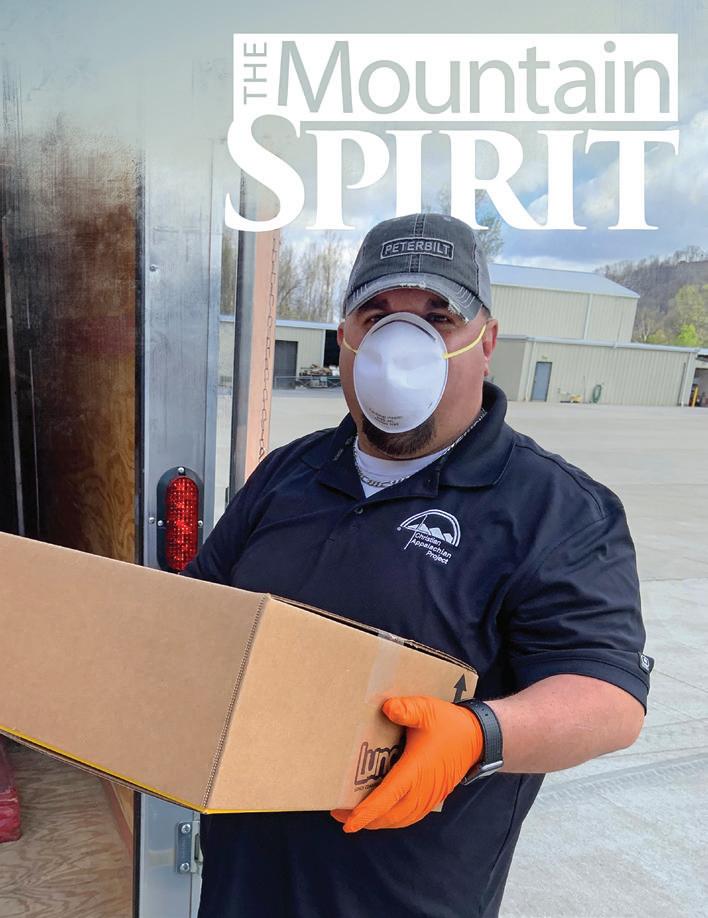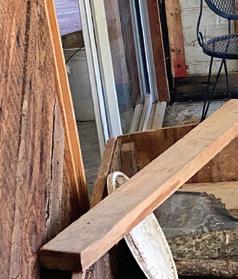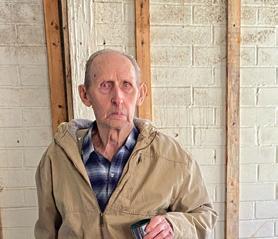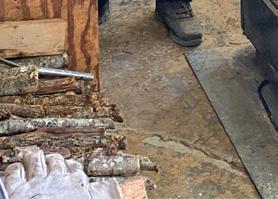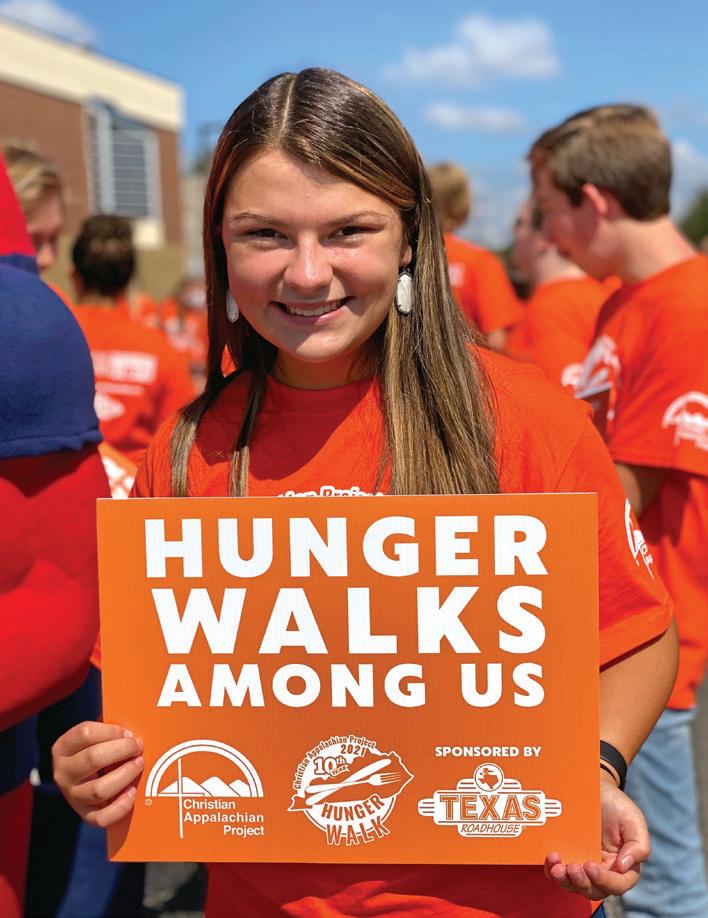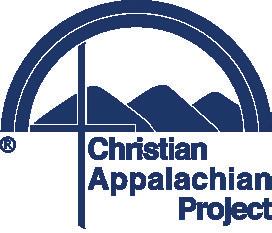n We Deliver Hope
n No Judgment
n Pay It Forward
n Dream Catcher


n We Deliver Hope
n No Judgment
n Pay It Forward
n Dream Catcher

One of the core tenets of our mission statement is that through the generosity of donors and the service of volunteers, lives are transformed in Appalachia. In this issue, we wanted to share stories of transformation from this year and past years as well.
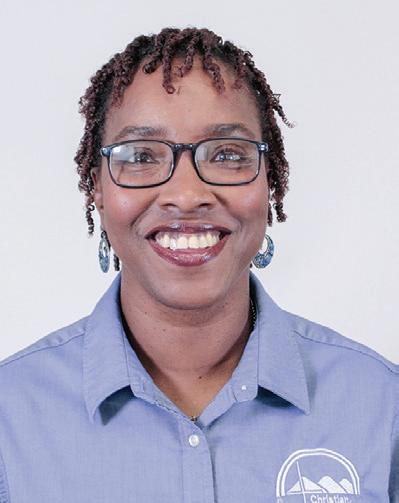
Building hope, transforming lives, and sharing Christ’s love through service in Appalachia.
EDITOR-IN-CHIEF & CREATIVE DIRECTOR
Tina V. Bryson
Tina V. Bryson tbryson@chrisapp.orgYou will read an update about Judy Stevens and her son Kenneth. I met the Stevens family my first year working for CAP. The entire freshman class of St. Anne’s-Belfield School in Charlottesville, Virginia, had come to Eastern Kentucky as part of YouthFest, CAP’s alternative spring break trip for high school students. A small group was tasked with building a 68-foot ramp to provide safe access for the home. Stevens has been an advocate for her son since he was born, and that commitment to providing her child with the highest quality of life led her to a lifetime of advocacy for children and adults with special needs. Read their story on page 16.
This past year, I met Karen Moore who had been living with a tarp for a roof, which led to additional damage to the interior of her home. Members of Crossroads Christian Church came together from Kentucky and Ohio to make Moore’s home safe, warm, dry, and accessible. Her story touched my heart and I know it will touch yours too. Read her story on page 22.
Tragedy struck Western Kentucky right before the holidays when deadly tornadoes hit Kentucky. CAP’s Operation Sharing and Disaster Relief responded to the needs by using their years of experience and expertise to respond to a request for help from local emergency management officials in Bowling Green, Kentucky. On page 6, find out how that call to action helped 4,218 people who needed essential items during a critical time.
On page 10, read about the 30-year anniversary of WorkFest, CAP’s alternative spring break for college students. WorkFest has been impacting the lives of college students for three decades, as they have in turn transformed the lives of participants by serving in our Home Repair Program and assisted in Disaster Relief and other programs when needed.
We hope these stories and others found in this issue of The Mountain Spirit will inspire you. Transformation happens in big ways and small ways, and none of it would be possible without your prayers and generosity. You make this work possible.
COPY EDITORS
Dennis Jacobs, Amy Schill
PHOTO CREDITS
Joe Beaudoin, Tina V. Bryson, Grant Harned, Sarah Marks, Kasey Mills, Brianna Stephens, Hannah Thomas
CONTACT US
By phone: 859.269.0635
Toll-free: 866.270.4227
Email: capinfo@chrisapp.org
Website: christianapp.org
SUBSCRIPTIONS
The Mountain Spirit is published twice a year. The suggested donation is $20.00. Subscription requests and other correspondence should be sent to:
Christian Appalachian Project
The Mountain Spirit P.O. Box 55911 Lexington, KY 40555-5911
Copyright 2022. Christian Appalachian Project, Inc. All rights reserved. Christian Appalachian Project is a nonprofit Christian service organization operating throughout Appalachia. Christian Appalachian Project is recognized by the Internal Revenue Service as a 501(c)(3) charitable organization and is qualified to receive tax-deductible contributions.
ON THE COVER: Robyn Renner, director of CAP's Disaster Relief Program, mobilizes staff and volunteers to help survivors in Bowling Green, Kentucky, following devastating tornadoes.
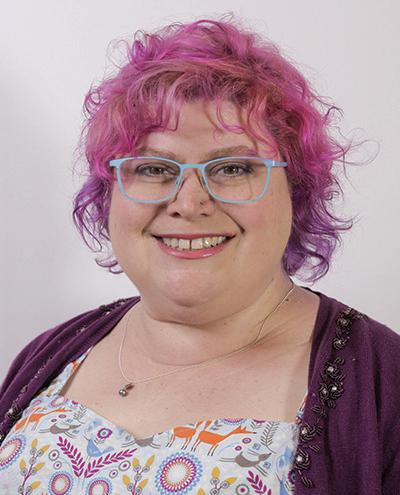

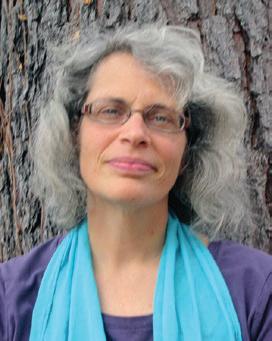
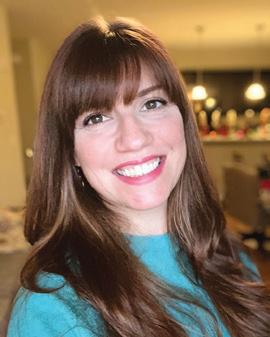
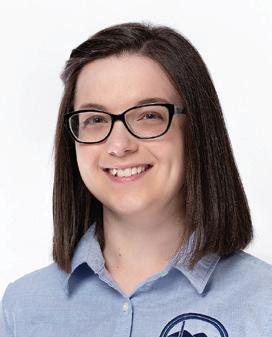

Sarabeth Brownrobie
Sarabeth is a CAP volunteer recruiter.
When Western Kentucky was tragically hit by tornadoes, CAP responded to a request to help manage the donation distribution center.
This year marks 30 years of WorkFest, CAP’s alternative spring break program for college students. Volunteers from around the country continue to make a difference in Appalachia through home repair.
Shannon Holbrook
Shannon is a freelance writer based in Central Kentucky.
Kim Kobersmith
Kim is a freelance writer and journalist in Berea, Kentucky.
Jennifer Lance
Jennifer is a CAP direct mail associate.
Brianna Stephens
Brianna is a CAP staff writer.
CAP profiles women in Appalachia to celebrate Mother’s Day. For Emmazell Gerken, a mother of three, it is faith that keeps her going.
This follow up story highlights the life-changing impact of students from St. Anne’s-Belfield School in Charlottsville, Virginia, for Judy Stevens and her son.
Sarah Marks practically grew up at Camp AJ as a camper and later a teen leader. Her grandparents were among CAP’s first employees.
Volunteers from Crossroads Christian Church helped repair the home of Karen Moore after flooding damaged her home.
This follow up story recaps what life has been like for the Mullins family since CAP helped build them a brand-new home.
Camp AJ staff watched Hannah Thomas grow up as she went from camper to program intern. She is preparing to graduate college in May.
Kaleb Uzzle
Kaleb is a CAP coordinator for the Gratitude Program.
Find BONUS stories in the digital version of the magazine at issuu.com/themountainspirit
Annie F. Downs shared her new children’s book with students through CAP’s Youth Empowerment Services Program and helped provide backpacks of food for students in Rockcastle County.
In 1974, a group of writers and activists gathered to form what became the Southern Appalachian Writers Cooperative, a grassroots effort of writers, editors, and activists from the region.
The Appalachian Media Institute is a media training program for central Appalachian youth based at the nonprofit arts and media center, Appalshop in Whitesburg, Kentucky.
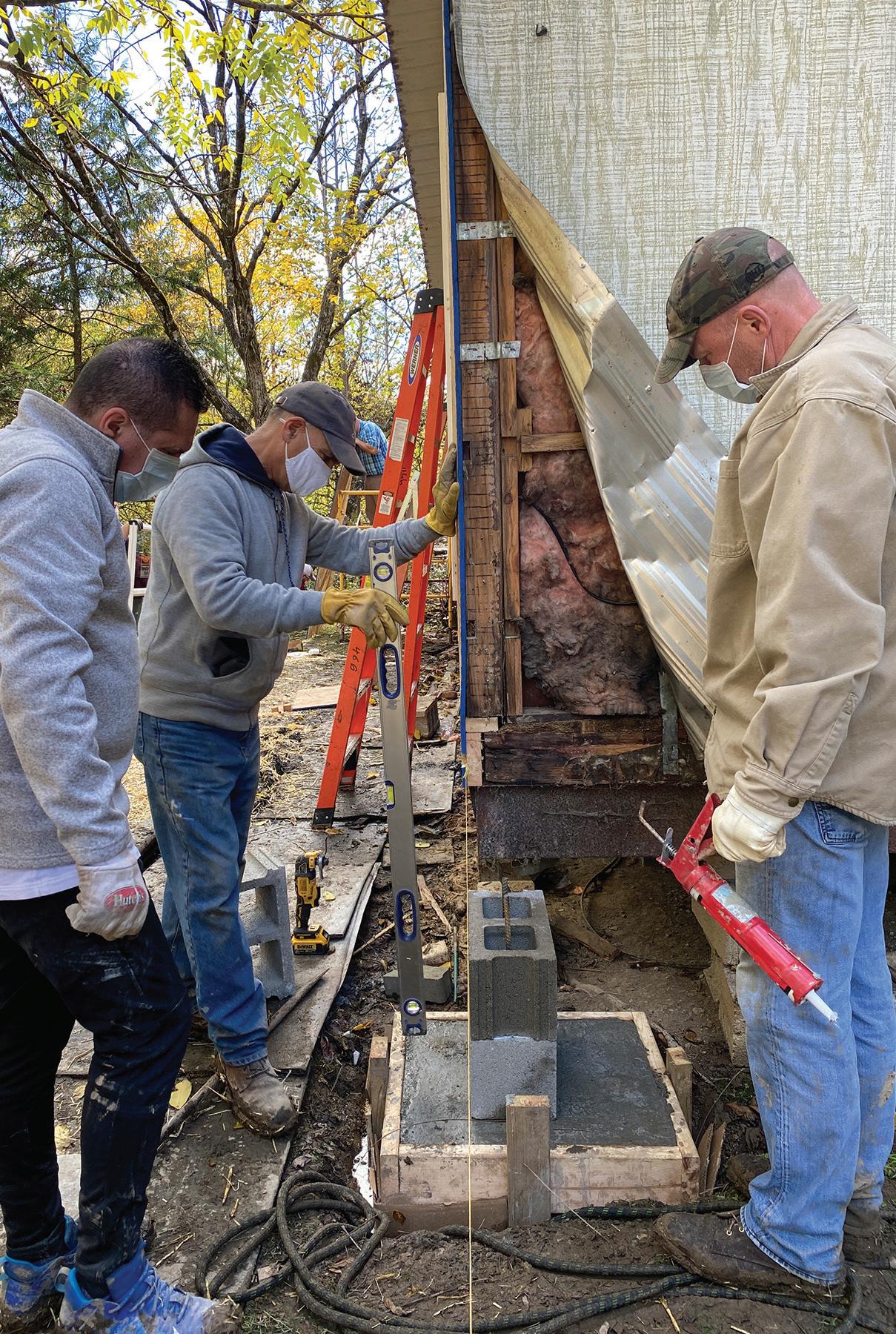
CAP named Carson-Myre Charitable Foundation as its 2021 Philanthropist of the Year. Since 2012, Carson-Myre has provided substantial, critical support to CAP and those who face poverty in Appalachia. The foundation was started in 1997 by Jane Carson-Myre to carry on her family’s legacy of generosity. The foundation supports Christian outreach programs in ministry, education, and aid to people in need. While the foundation has worked primarily to improve life in Western Kentucky, they have extended their service to support efforts to improve the lives of people in need in Eastern Kentucky. “Gifts from our supporters like Carson-Myre Charitable Foundation
In October, a group of employees from CESO partnered with CAP to help a family of five who needed renovations to their home and an addition. The repairs were too extensive and expensive for the family to do alone. CESO is a comprehensive firm, headquartered in Dayton, Ohio, with offices across the country, that provides surveying, civil engineering, environmental, land planning, and architecture services. The company financed the project and brought staff from five of their seven offices to volunteer with CAP and spent a week installing new flooring, windows, and doors, as well as completing preliminary work on the addition. The doublewide needed a porch on the front and back to provide safe access in and out, in addition to insulation, kitchen and ceiling repairs, a step-in shower, and a new septic system.
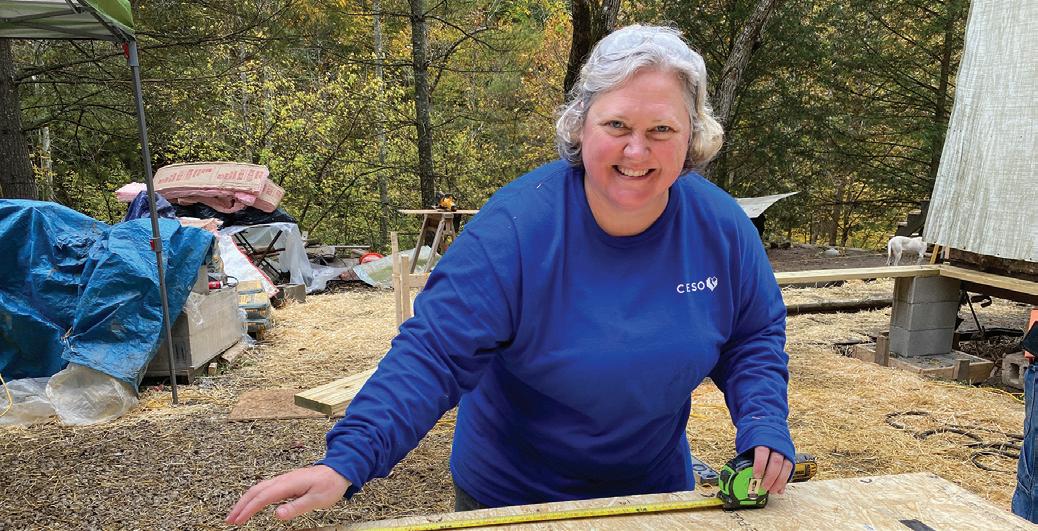

allow Christian Appalachian Project to extend a community of care to people who need basics like food, clothing, and shelter,” said Dennis Jacobs, CAP’s senior foundations officer. “These partnerships are integral to the work we do.”

In December, Christmas was made possible for 471 families (1,003 children and 702 adults) during the annual Christmas distributions hosted by CAP’s Family Advocacy Program. This was the second year for the drive-thru events because of the pandemic’s ongoing restrictions. Six teens who are a part of CAP’s Teen Leadership program, a component of CAP’s Youth Empowerment Services Program, helped decorate and assemble 216 Christmas goody bags for the drive-thru distribution for Johnson, Martin, and Floyd Counties. In Jackson County, Annie F. Downs, an author, podcast host, and speaker, volunteered alongside CAP staff to distribute Christmas gifts and hams to families.
Shortly after Eagle Food Pantry opened in McCreary County, Kentucky, to serve the Parkers Lake community in June 2021, ground broke on an expansion of the facility. The expansion includes a 2,760 square foot facility that will have offices, a covered area for drive-thru service, a shopping area that will provide participants the opportunity to select what they need for their families, freezer space for perishable items like meats, and a loading dock to accommodate large deliveries for the pantry. When the pantry opened, staff estimated at least 800 families in the area faced food insecurity. A group of 20 volunteers led by
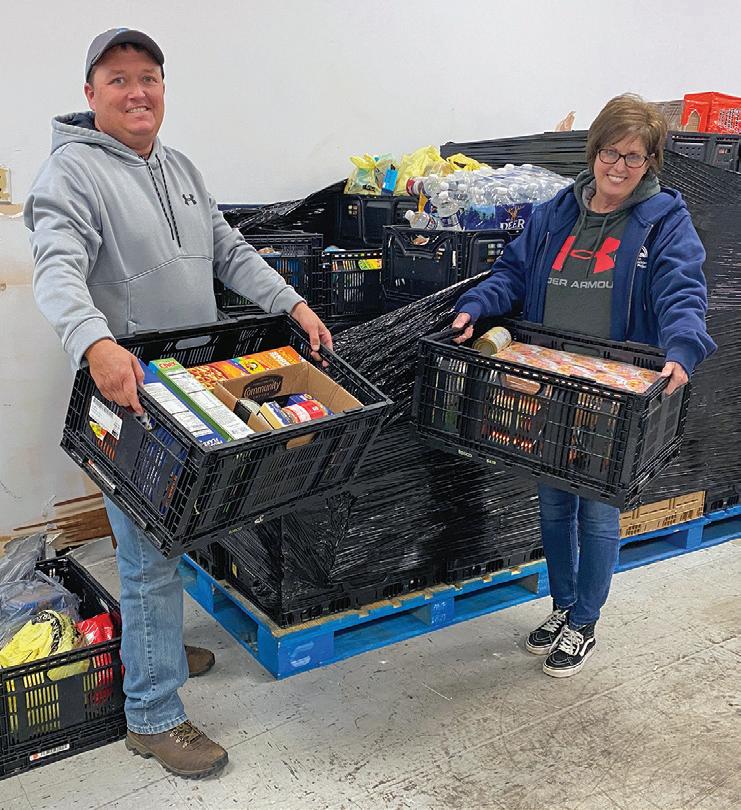

Steve Tate, a CAP donor and volunteer, made substantial progress on the expansion in November. Tate brings a team of volunteers at least twice a year to volunteer with CAP’s Facilities Management staff to complete capital improvements that free up funds that CAP can then use for direct human service programs.
Less than two weeks before Thanksgiving, Garrard County Food Pantry, in Lancaster, Kentucky, suffered a total loss after a fire. In response to the devastation, CAP’s Grateful Bread Food Pantry reallocated food collected by students and staff at Rockcastle County Schools and Lexington Christian Academy during its annual Hunger Walk. The event collects food and funds to address food insecurity, and help meet the needs in Appalachian communities. Alongside the contributions of other organizations and agencies, Grateful Bread staff and volunteers delivered 5,000 pounds of food to Garrard County to help ensure children, their families, and seniors in the community would have meals throughout the holiday season.

A neighborhood in Bowling Green, Kentucky, was left crumbled in the wake of a catastrophic tornado that hit the area.
Hope is a powerful thing. Sometimes, even in the most dire of circumstances, it is knowing that you are not alone that gives you strength to face whatever comes next. After a catastrophic EF4 tornado hit Western Kentucky in early December, emergency management staff were overwhelmed by the generosity of donations that poured in from across the nation. Christian Apppalachian Project (CAP) was asked to manage the logistics of getting essentials to families in need. The tornado left tragedy in its wake with at least 80 dead, 12 counties impacted, and more than 12,000 families registered with FEMA for assistance.
“There was a large outpouring of donations to help families in the region. CAP coordinated volunteers who organized and distributed essentials as quickly as possible to address a variety of needs in the community,” said Robyn Renner, director of CAP’s Disaster Relief Program.
Renner is no stranger to disaster relief efforts and understood that this was a critical time for emergency management personnel who had to do the difficult work of search and rescue immediately following the five tornadoes that touched down in Western Kentucky with one wreaking havoc over 220 miles from Arkansas through Kentucky and Tennessee.
“It’s not just Disaster Relief, CAP’s Operation Sharing Program also transported numerous tractor trailer loads of donated items to impacted communities. We could not have done this without their support,” Renner said. “Whenever disaster strikes, Operation Sharing coordinates with partners to provide water, nonperishable food items, hygiene items, and other essentials.”

“I’ve gotten so much from my community. I feel like I am doing what God asked to pay it forward.”
— Johnalma Barnett
Operation Sharing logged 4,400 miles with our work in Bowling Green, Kentucky, including 47 individual trips to transport donated items to and from the regional distribution center and other smaller sites throughout the impacted states. This critical work helped get essential items to tornado victims, many who were stranded because their vehicles were also damaged during the tornadoes. Each week, Operation Sharing sent a forklift driver to assist with logistics at the Bowling Green Distribution Center.
Volunteers came from across Kentucky, as well as other states. Just over 500 volunteers, including CAP employees and volunteers, assisted 4,218 participants (1,533 households). This totaled more than 3,650 volunteer hours. Becky Neuenschwander, who coordinates CAP’s Mission Groups Program, assisted Renner with logistics at the distribution center.
“For me, it's been eye opening. CAP being there made a huge impact for the city of Bowling Green, especially for the distribution center,” Neuenschwander said. “We were consistent and we showed up every week with a team of 15-20 volunteers who were dedicated to getting the work done. We saw what we could do to get more donations in and get the people what they needed. It’s part of the CAP culture to go to wherever the need is and to find a way to be able to pivot and respond to that need.”
Renner is quick to remind supporters that a response to a disaster of this magnitude is a marathon and not a sprint.
“In the wake of such devastating natural disasters, our first concern is always for the people impacted. Every situation is different, and we assess each disaster, especially outside of



Eastern Kentucky,” Renner added. “What we know is that natural disasters of this scale draw lots of media attention and assistance immediately following, but these communities will need assistance for months, even a year out.”
Neuenschwander said even after a few weeks she saw a difference in interactions with community members who came to the distribution center.
“Then, they were trying to deal with what had happened to them. They needed support,” she added. “We tried to put them with a counselor or clergy because now they were wanting to share their story and show you pictures, and just have someone to talk to about it. Some of them were just struggling to come to terms with


what had happened and what the next step was.”
Community volunteers also became a part of the CAP family in helping survivors sign up for services and select needed essentials from the center. FEMA and Red Cross were also housed in the Bowling Green Distribution Center which provided a one-stop emergency assistance hub.
“I’ve gotten so much from my community. I feel like I am doing what God asked to pay it forward,” said Johnalma Barnett, a retired logistics manager with Western Kentucky University who volunteered at the distribution center. “If you didn’t have any damage at all, then you’re blessed. It’s a chance to bless someone else. We just need to help each other.” n
(Top left) Lexington Christian Academy and Ronald McDonald House partnered with CAP to send water and other essential supplies to the victims of the Western Kentucky tornadoes.
(Top middle) CAP’s Operation Sharing Program transported essential items and donations to and around Western Kentucky after tornadoes impacted the area. Pictured is Richard Smith, an Operation Sharing tractor trailer driver.
(Top right, bottom left) First Lady of the United States Jill Biden, Kentucky Governor Andy Beshear, and Kentucky First Lady Britainy Beshear visited CAP’s distribution center in Bowling Green to speak with and thank CAP staff and volunteers.
(Bottom right) Kathy Kluesener, a former CAP employee, helped sort diapers, baby wipes, and other infant essentials at the distribution center in Bowling Green during January.
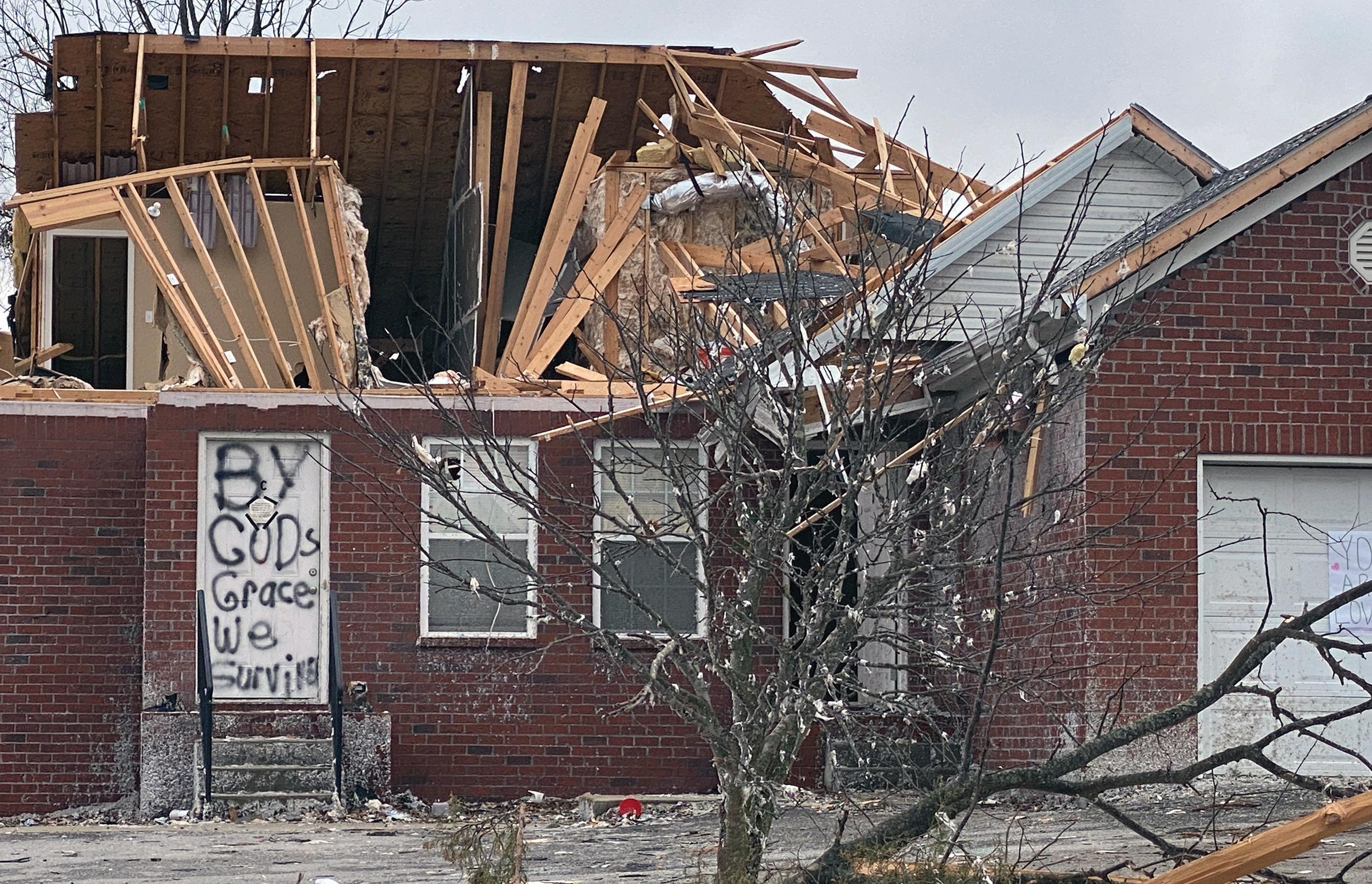
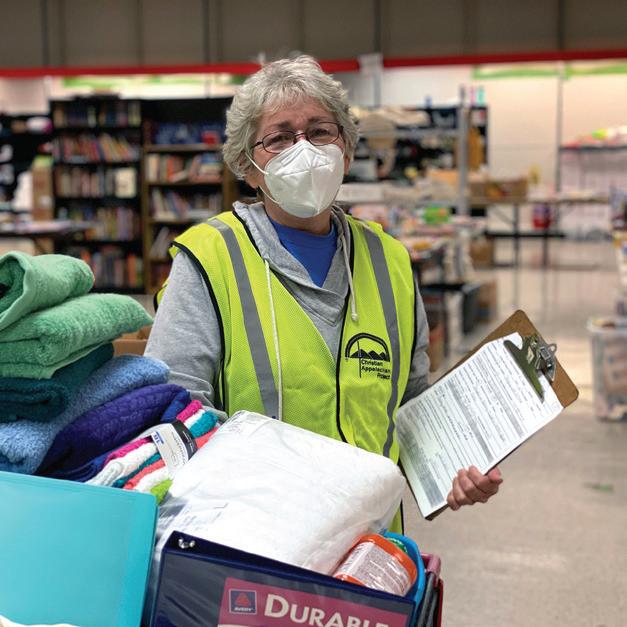
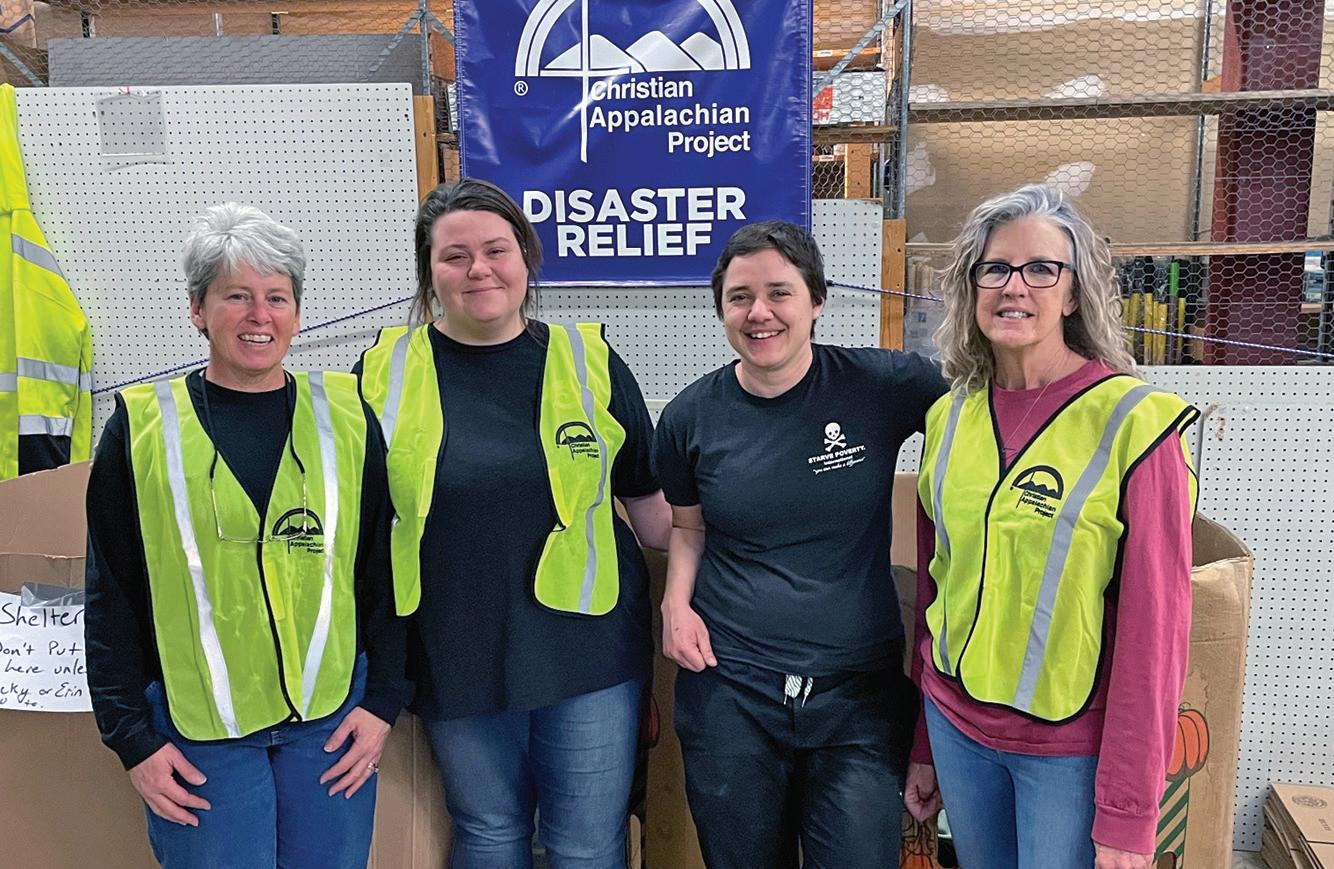
Operation Sharing meets immediate needs and Disaster Relief walks alongside families to help them get back on their feet.
When natural disasters strike, families need help piecing their lives back together. When the unthinkable happens, We Deliver
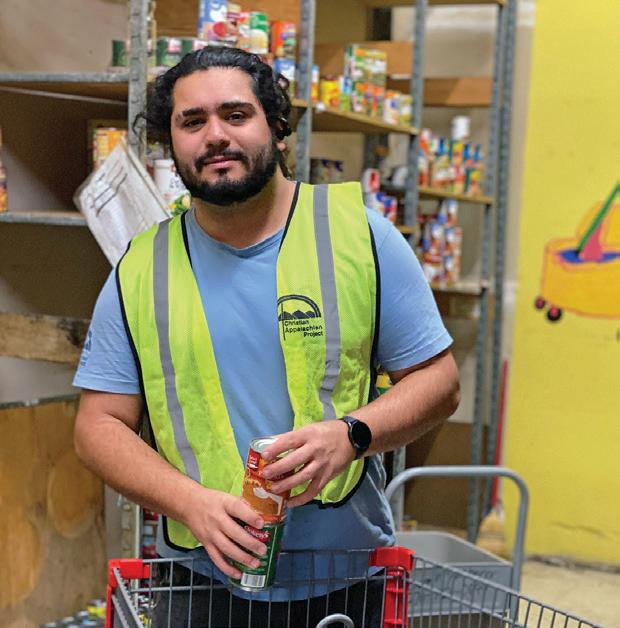

Throughout Christian Appalachian Project’s (CAP) nearly 60-year history, hundreds of participants have had their homes made safe, warm, dry, and accessible through the hands of the thousands of volunteers called to the mountains. It’s the incredible story of what happens to generous volunteers who come to repair houses at WorkFest, deepen their faith, build life-long relationships, and connect to the resilient people of Appalachia. This is the story of just three of those volunteers.
John Trokan, a faculty member at Mount St. Joseph University in Cincinnati, Ohio, arrived in Appalachia in 1992, the first year of WorkFest, with a group of students. For many, this was a chance to reconnect with their heritage as they had Appalachian parents or grandparents. By year two, Trokan had developed a companion course to help his students connect more deeply with the region and the people.
“One of the things I learned over time is that this is a reciprocal rela -

tionship,” said Trokan, who believes the trip provides more than home repair skills. “When we engage in any volunteer experience, it's about giving and receiving. It's that relationship and recognizing God’s presence, that is really transformative. And I think, for me, it helps me understand who I am.”
Rev. Ralph Beiting, CAP’s founder, often challenged students during WorkFest, by saying "Don't be ordinary, don't settle for being ordinary, but be extraordinary for others." Although Beiting was speaking directly to students, Trokan said
that everyone there took that message to heart. “CAP opens up doors and enables students to see that there’s a rich way of living life with meaning by serving others,” he explained. Mount St. Joseph students who have been a part of the annual trip have gone on to volunteer for a summer, serve as oneyear volunteers with CAP, and even become employees. Others have found ways to bring the spirit of WorkFest into their own communities contributing countless volunteer hours to local organizations.
While Trokan’s first trip to WorkFest was planned, Andrew Wegrzyn’s was more of a whim. A friend asked him if he wanted to go to Kentucky on spring break and Wegrzyn simply replied, “Yeah, sounds good.” Since that very first visit, he’s taken 10 trips and served on CAP’s National Advisory Board and Board of Directors.
Wegrzyn was captured by the spirit of the Appalachian people from the very beginning. “The genuine openness and the spirit of the people of
"Don't be ordinary, don't settle for being ordinary, but be extraordinary for others."
— Rev. Ralph Beiting


Appalachia was incredibly endearing. From my very first trip I noticed it and have appreciated every time I've come back,” he explained.
In the beginning Wegrzyn was focused on physical service and construction, but he realized that
the experience was deeper than that. “You go there thinking you're going to do all this construction, and you do. But then you also get these encounters with the awesome people in Kentucky and those types of experiences last much longer,” he said.
And then there is Amy Schill. She was a sophomore at the University of Notre Dame when she attended her first WorkFest as part of a one-credit course called the Appalachian Seminar. Because of previous service trips, Schill knew it would be rewarding, but she had no idea how aware of the Holy Spirit she would become or the sense of being at home in Appalachia she would feel. “I had the experience of being in one of those ‘thin places’ where the line between Heaven and earth is unclear,” she remembered.
A few weeks after Schill’s second trip she ran into another student
(Above) Katrin Arango participates in WorkFest 2017. (Left) The 2001 cover of The Mountain Spirit magazine highlights our tenth WorkFest.
from WorkFest. She blurted out, “I think I want to go volunteer there for two years after college, then become an employee and stay there forever.” And that is what she did. Schill currently works as CAP’s AmeriCorps specialist. “I took on this behind-the-scenes work so that our staff and members can focus on their direct service,” she explained.
Schill believes that WorkFest encapsulates the spirit of the entire organization. “CAP is essentially an ever-growing group committed to loving God by loving neighbors,” she said. “We do it imperfectly, we like to have a lot of fun while we’re doing it, and sometimes we eat too many donuts in the process. It’s the best way we’ve found to invite people to our mission. Once you’ve experienced it, you can’t help but want to stay involved.” n

WorkFest is a special annual event that welcomes college students from across the nation for an alternative spring break. Service has been the hallmark of WorkFest for 30 years but food, fun, and fellowship also help create memories for years to come.













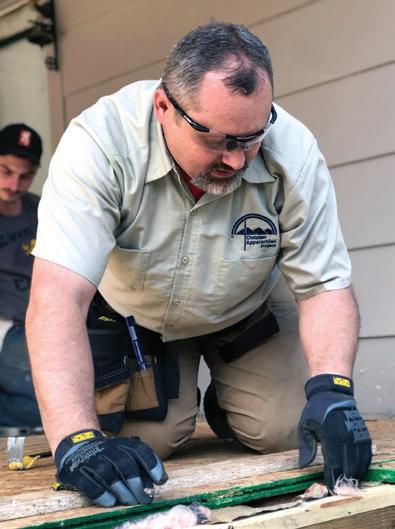

Her infectious laugh belies the struggles she has lived as she has spent most of her life caring for others. Even at 78 years old and legally blind, she hasn’t lost the whimsy of her childhood, recounting how her father gave her the nickname Trigger after Roy Rogers’s horse.
“I’m the head and not the tail,” said Emmazell “Trigger” Gerken, with a giggle, recalling how her nickname followed her throughout her life without most people ever knowing her real name. “Even my preacher, he came by with a food box for Thanksgiving. We used to be neighbors when he was a young boy. He was surprised to learn my real name.”
As a young girl, Gerken missed school to help take care of younger siblings. She admits to lacking formal education due to her absences but had to help her mother at home. Despite only making it to eighth grade, she gained valuable skillsets in adulthood which allowed financial security for her family.
“I was smart, you know, not to have an education,” said the Knott County resident who worked in restaurants and cleaned houses while raising three children. She also provided care to people in need and worked at General Electric.
When her marriage ended, which forced her to care for her children alone, she took a job driving a rock truck at a strip coal mine. Standing at 5 feet 5 inches, Gerken could not reach the steps to the tall truck’s cab causing her coworkers to lift her to the steps each day. Laughing, she joked, “They are easy to drive once you are in them, but they sure are dangerous.”
She cannot work anymore and receives help from Christian Appalachian Project’s (CAP) Elderly Services Program. “Thank God for CAP. They are my friends and

Gerken is
for the help she receives from CAP’s Elderly Services Program. CAP’s caseworkers take her to doctor’s appointments, ensures she has what she needs at home, and bring her food and small surprises, like flowers. (Right) At Thanksgiving, CAP’s Elderly Services caseworkers delivered Emmazell Gerken and participants meals for the holiday.
are fantastic,” she said. “They’ve given me a new refrigerator and mattress, brought me dinners, and taken me to doctor’s appointments. I am so thankful they are in this part of the country to help me and others far worse than me.”
For Gerken, faith is what keeps her going. “I’m not ready to die and still have too much going on in my life. I’ve got good friends and family. There’s much for me to enjoy and I love to dance. When my mother was alive and played the banjo, we kids danced the jitterbug. Not too long ago, I heard a banjo playing on TV, and buddy, I hit the floor,” she recalled with a laugh. “You would’ve never known I’d had a stroke. I couldn’t get with it the way I wanted to, but I sure did dance around all over the floor.”
Although she has known her share of hard times, she has simple advice to others who may be facing challenges. “You contact CAP, honey, and they will help you,” she said.
With nothing stopping her anytime soon, Gerken is now on a mission to find a stationary bicycle so she can “keep pushing.” n

“I’m not ready to die and still have too much going on in my life. I’ve got good friends and family. There’s much for me to enjoy and I love to dance."
– Emmazell “Trigger” Gerken
Help came in the nick of time. Just three days after the freshman class at St. Anne’s-Belfield School completed a 68-foot ramp at the home of Judy Stevens, it was needed to get her son Kenneth to an ambulance.
The home, built in a holler, had concrete steps in the back which already made access to the house precarious, but as Kenneth’s mobility began to deteriorate, Stevens knew she had to do something to help her son. So, she did what she always does, she prayed.
“I don’t know what I would have done without that ramp,” said Stevens, recalling her son’s emergency following the week of volunteer assistance provided by teens from Charlottesville, Virginia. “I prayed, ‘God, give me a ramp.’ God had to be a part of it. These children, I consider them one of the greatest blessings in my life.”
Kenneth was born in 1959, totally blind, and with a range of other lifelong health issues. But he also had a mother that championed his right to a quality, public education and became an advocate for children and adults with special needs in the community.
“I had friends who were concerned about my situation. They wanted to help since there were years that I had to take Kenneth to specialists in Louisville, Lexington, Huntington, and Charleston,” noted Stevens. “I had to get him the help he needed. Everything I did, I did for him. I fought for him.”
After Stevens lost her husband, she continued to provide care for Kenneth, but knew that access in and out of the house would continue to present a challenge.

Before a ramp was added to the back of Judy Stevens’s home, the steps made access to the home precarious. As her son’s mobility began to deteriorate, she knew something needed to be done to help him.
Any time the ambulance had to be called there just wasn’t enough space to maneuver around the side of the house, and the concrete steps became an increasing obstacle.
“Kenneth’s mobility and coordination are mostly gone. He’s over 300 pounds. As he has aged, and I have aged, there is a fear around what will happen,” she said. “Sometimes he can’t get out of the bed even to eat. He has an extra-large wheelchair, but it’s hard to lift him.”
Before the new ramp was installed, the old ramp had decayed and was so compromised that they had to tear it down. He still sees several specialists for regular doctor visits and the ramp has been transformational.
Since then the

been
“These children were from different cultures, some black and some white, but they all had the same heart.”
— Judy Stevens

“The children that built this ramp for us were remarkable. Everyone with CAP and the students we bonded like family,” Stevens noted. “These children were from different cultures, some black and some white, but they all had the same heart. Why can’t it be that way in the world? Jesus was the essence of mercy and love. They showed that. Love only has one color.”
Stevens is grateful for her son, her advocacy for children and adults with special needs, the mission of CAP, and the students who made a difference for her family.
“Kenneth wasn’t supposed to live past 5 years old. I asked them to remember his name when they pray,” she recalled. “They invested in a mother taking care of her son. I have an overwhelming appreciation for them. I want them to remember Kenneth and think about how they will help the other Kenneths in the world. They took something away from this that will motivate a lot of them to continue this work.” n
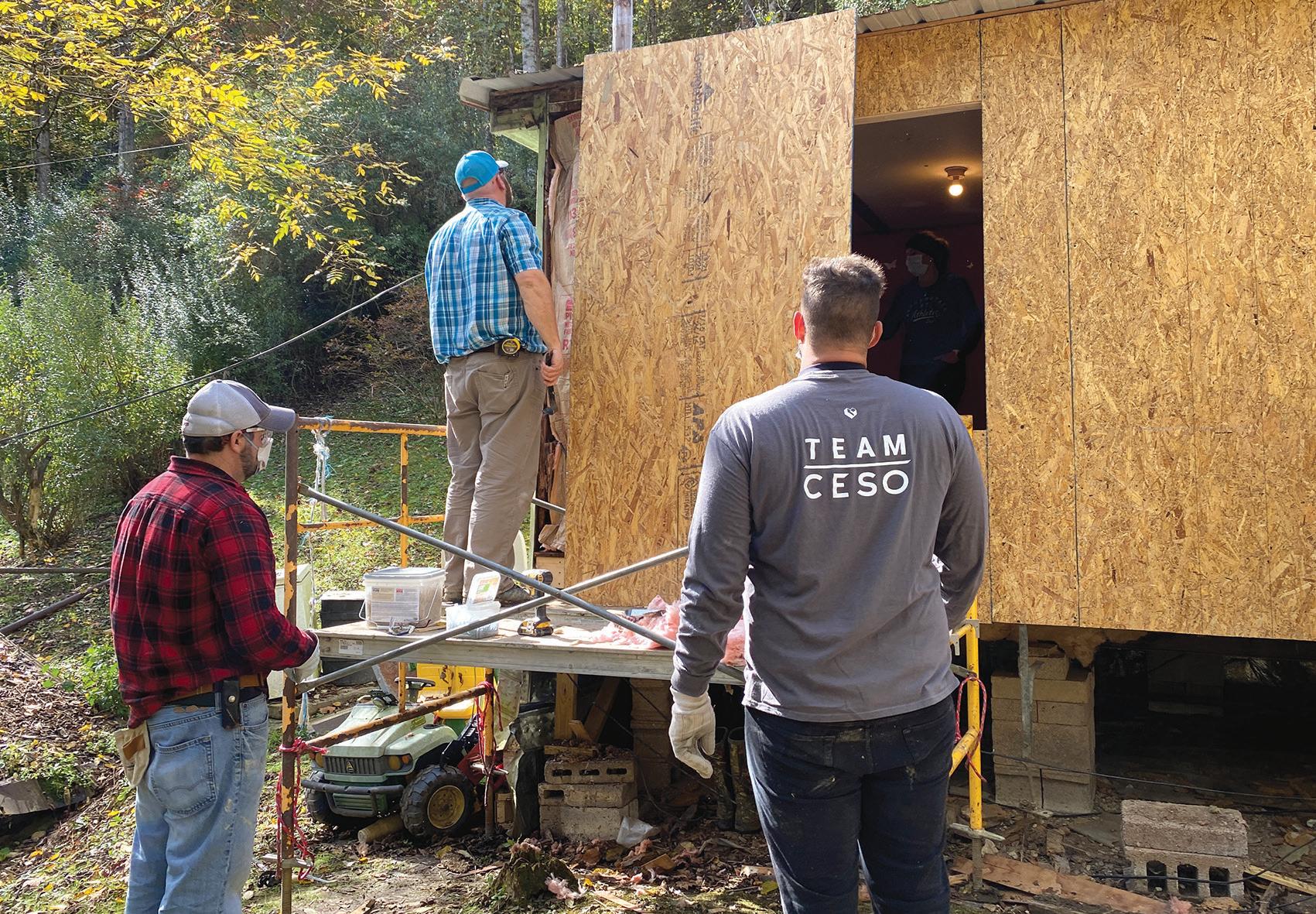
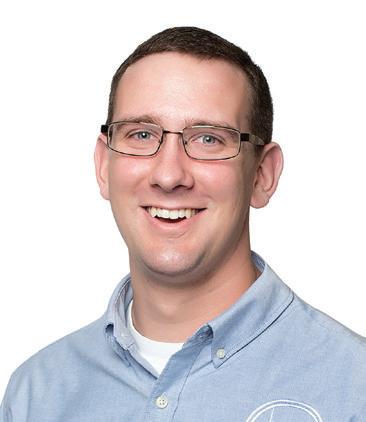
Sarah Marks was part of the Christian Appalachian Project (CAP) family before she was even born. Part of CAP’s original mission was providing jobs in her hometown of McKee, Kentucky. Her Papaw had a forestry degree from the University of Kentucky and was hired to oversee a new sawmill. He later was able to purchase the mill and clear the land that is now Camp AJ.
Marks loved hearing her father’s stories of attending the camp. One favorite breakfast activity was when campers had to find their cereal boxes and fruit which was hidden in the trees before they could eat. Her father also recalled the esteem that residents held – and still hold – CAP in the community, when nuns would drive all over the county and pick up kids for a week at camp.
“CAP is always a big part of the community because of the good work it does,” said Marks, who is 17 and operates her own photography business. “CAP people are exceptional. They care so much about their work, the region, and the people they serve.”
Last summer, she added her own stories to the CAP family tradition as a teen leader at Camp AJ. Even though the residential experience was canceled because of the pandemic, she said the spirit of camp lived on. The staff went out into the community to lead programs at elementary schools, help at Grateful Threadz Thrift Store, and work at community food distributions.
Marks’s own respect for CAP’s work was part of her impetus for serving as an AmeriCorps member last summer. “There is an epidemic of voluntourism other places, but CAP does work that is wanted in the region,” she said. “They build long-term relationships with participants and are a consistent presence.”
Academically driven, Marks excels at school. The valedictorian and president of her graduating class, she earned

38 college credits in high school through dual-credit classes. She is now a student at the challenging Centre College, working towards a behavioral neuroscience major on a pre-med track with a minor in studio arts.
Partly because of her service with CAP, Marks has realized that is not enough. “Academics is important because I want to be a doctor, but I can’t just focus on academics,” she said. “I need to care for people in the community and be empathetic.” Service work has given her a different perspective, a willingness to understand what people are going through and how she can best be of help. Serving at Camp AJ this summer gave her the opportunity – the privilege – to serve in her own community and brought her family story full circle.
As Marks looks to the future, she wants to make a difference in her home region. While she may return this summer to serve with CAP again, she aspires to finish medical school and return to Appalachia after gaining experience. “There is something incredibly special about the region, so much that you can’t get anywhere else,” she said. “I want to give back in the way Appalachia has given to me.” n

“There is something incredibly special about the region, so much that you can’t get anywhere else. I want to give back in the way Appalachia has given to me.”
— Sarah Marks

She could hear the sound of the raindrops keeping time with the beats of her heart as the water hit the tarp that was her roof. She had done her best, to fight through the pain of her arthritic hip that needs to be replaced and her knee with a rod where she once broke her femur, to weigh down the tarp so it wouldn’t blow away. Past times she had paid neighbors or anyone that would help to put stumps, bricks, or anything that might hold it down. The rain came anyway. The wind blew the tarp roof askew and it was like it was raining on the inside. Karen Moore made it through that night, and many more like it, but the worst was still to come.
“Even before the flood, the house was falling apart,” Moore said. “I had so many water leaks in the roof that my floors were falling through in the bathroom and the kitchen. There were big holes everywhere. I couldn’t afford to do much.”
Moore had been on the waiting list with Christian Appalachian Project (CAP) for two years to get all the repairs done. She was looking forward to getting the work started, then COVID-19 protocols were put in place. Before repairs could be scheduled, her home, where she has lived for nearly four decades, could not withstand the deluge that accompanied the historic spring floods in 2021.
“I had MacGyvered my house,” she said with a laugh. “I had a board, a little smaller than a 2x4, where I could stand in my kitchen. I had another board stuffed underneath my commode because the flooring was just gone. That board was the only thing that kept the whole thing from falling through.”
But when the floods came, the floor in the kitchen just dropped down, and what remained of Moore’s makeshift kitchen sink was destroyed.

Ron Morrow, a crew leader in CAP’s Home Repair Program, was doing flood assessments in the area, and learned that Moore was already on the waiting list. He made her a priority to get the job done.
Moore received a new front and back porch. Both were rotted and she had MacGyvered them too with a clear path of boards to step on to keep from falling through. She received a new roof, windows, and flooring too. Volunteers from Crossroads Christian Church in Kentucky and Ohio helped make Moore’s home safe, warm, dry, and accessible.
“It feels good to just be able to stand up to my new sink and wash the dishes,” she said. “Or go to the bathroom at night without fear of falling off the commode, which was not very stable, or maybe even falling through the floor.” She is grateful for everyone that helped make her house a home.


“I love every one of them. There are just no words. They helped when they didn’t have to and that means the world to me.”
— Karen Moore
“I had a lot of anxiety because I knew I didn’t have the money and it was getting to where I was going to be homeless, I really was,” she said. “I told the volunteers when they were here how much I appreciate them. It means so much to me and I didn’t feel any judgment from them about the condition my house was in.”
She added, “I love every one of them. There are just no words. They helped when they didn’t have to and that means the world to me.” n
On an early December morning, Bertha Mullins and two of her children, Casey and Josh, sat around a Christmas tree that stood in their living room window, waiting to be decorated by the youngest members of the family. When their home was built by Christian Appalachian Project (CAP) in 2019, they said they looked forward to creating new Christmas memories.
“A memory we will always cherish was building an Oreo gingerbread house last Christmas,” Casey said with a grin. “Having the grandchildren together and hearing their laughter, you can’t beat that. That’s what makes the holidays.”
The family lost their previous home to 18-foot flood waters in 2015, and their home before that to a fire. As the family faced the devastation and the stress of finding a new home, CAP stepped in to provide both comfort and concrete help.
“When the floods hit Johnson County, I saw Bertha’s home and the damage that had been done to her belongings,” said Robert Moore, a CAP Home Repair Program crew leader who oversaw the construction of the home. Her previous house was destroyed. “No matter who I am working for, I love to be able to address their concerns and give them peace about where they are living. I am always excited to do a new build because they are not the normal repairs we usually do.”

“When you are given acts of kindness like what CAP has done for us, you always pay it forward.”
— Walter Mullins
When the footers were poured, volunteers from across the country came alongside CAP and the Mullins family to build the home. They left encouraging messages on the beams, posts, and dry wall as it was being built. Those messages still resonate with the family today.
“It was a blessing to have had all of those people come to work on this home with us,” Bertha said. “I don’t know how we could ever repay them. We’ve been blessed to have this home.”
Ever since the home was under construction, the Mullins family felt it united them during some of the most challenging moments of their lives. As they do for everyone, challenges continue, and the family is grateful to have their home to come back to at the end of the day.
“We were in a world of darkness, but when CAP came, a bright light turned on. For once we feel safe,” Casey said. “We truly hope those who helped with our home know the impact they had on us, espe-


cially for our little sister, Mindy, who they would talk to, play with, and learn a dance from. The light in her was gone for a while because of how young she was during all of what we had been through. She was 3 when the flood happened. Now she is 9 and she has a safe home, her own room, and a yard to play in. Those acts of kindness brought her smile and laugh back.”
Since volunteering to help build his own family’s home, Josh committed to two years of service at CAP through AmeriCorps to make homes in Appalachia safe, warm, dry, and accessible. Before that, Josh volunteered occasionally in CAP’s Family Advocacy Program, but through his one-year commitments he served alongside Moore and other staff and volunteers in the Home Repair Program.

(Above) Josh Mullins served two one-year volunteer and AmeriCorps member commitments in CAP’s Home Repair Program. (Top left) The Mullins family lost their home to flooding in 2015. (Left) CAP Home Repair Program Crew Leader Robert Moore, pictured at left in the photo, worked with the Mullins family and groups of volunteers to build a new home in 2019.
“Josh was reliable, skilled, and fun to have around,” Moore said. “He was very practical in how he approached home repairs and wasn’t afraid to get his hands dirty. He was a faithful servant for his community.”
It wasn’t until his one-year volunteer commitment that Josh discovered he wasn’t the only member of his family with CAP ties. “I learned through interactions with CAP members about the history of the organization which taught me my dad was an active part of CAP prior to my commitment to a year of service,” Josh said. “When CAP transitioned between the 1980s and 1990s, my dad was serving CAP. I learned that I was continuing the legacy my dad had started.”
His dad, Walter, was inspired to serve with CAP after the organization was there to help his family several years ago. He used his volunteer service
to help others and make a lasting impact. “When you are given acts of kindness like what CAP has done for us, you always pay it forward,” Walter said. “No words of gratitude were enough for what CAP did for my family. Acts of kindness done towards you need to be given to many. That’s exactly what Josh has done and what the rest of our family hopes to do in years to come.”
In December Josh finished his second year of committed service to CAP, but, like the rest of his family, remains loyal to serving his community any chance he can. “There’s not enough words to tell (you) about my experience with CAP,” Josh said. “Even though my commitment is done, CAP always knows they can call me when they need help.” n

The tune is unmistakable, the words unforgettable: “When you wish upon a star, Makes no difference who you are, Anything your heart desires, Will come to you.” Hannah Thomas has found her own magical experiences in the mountains of Appalachia and it’s not a fairytale.
“People look at Disney as the most magical place on Earth, but for me, the most magical place on Earth is Camp AJ,” said Thomas, an intern with Christian Appalachian Project’s (CAP) Youth Empowerment Services Program. This includes summer camp, teen leadership, and in-school tutoring. She knows the magic of Camp AJ more than most, having attended camp as a child alongside family and friends. “We give these kids everything we've got to make sure that at least for that week, they don't have to deal with a rotten home life or struggles. They can come to camp and just be kids.”
Camp AJ is one of two overnight camps that CAP offers as a retreat for children in low-income families in Appalachia. For Thomas though, her journey with Camp AJ began long before she was an intern.
When she was just 6 years old, soon to turn 7, Thomas attended Camp AJ for the first time the week of her birthday. She had no idea that during the week, campers and counselors would be celebrating her birthday with cake and banana pudding.
“I had just met the camp staff so they were basically strangers to me. So, I was shocked that they would take the time to celebrate my birthday,” Thomas recounted. She still remembers their kindness from that very first week and throughout her childhood. She attended Camp AJ every summer she could.
She grew up hearing stories about Camp AJ and seeing the difference it made in her family. Many of her cousins, aunts, and uncles have also attended over the years and one of her cousins gave Thomas her camp name, a fun, silly name by which all camp staff and volunteers are known in the summer.
Thomas knows that Camp AJ transformed her life. She still remembers the day that she was invited back to camp as part of a teen leadership retreat and her surprise when they invited her to become a junior counselor. Those milestone moments cemented in her the value of service.
“People look at Disney as the most magical place on Earth, but for me, the most magical place on Earth is Camp AJ."
— Hannah Thomas

“Camp AJ is a big part of who I’ve grown to be,” said Thomas who is majoring in sociology at Eastern Kentucky University. “It definitely built my confidence because dealing with kids requires a mature mindset.”
She is still pursuing a happily ever after, but she is not waiting on a fairy godmother. Thomas has learned to make her own wishes come true. She plans to continue the good work that CAP has done for her community and family.
“CAP has impacted the community in so many ways,” said Thomas who hopes to transition from intern to long-term volunteer. Her dream is to one day work fulltime at Camp AJ. “The big picture behind it all, is the smile that is behind the help provided.” n
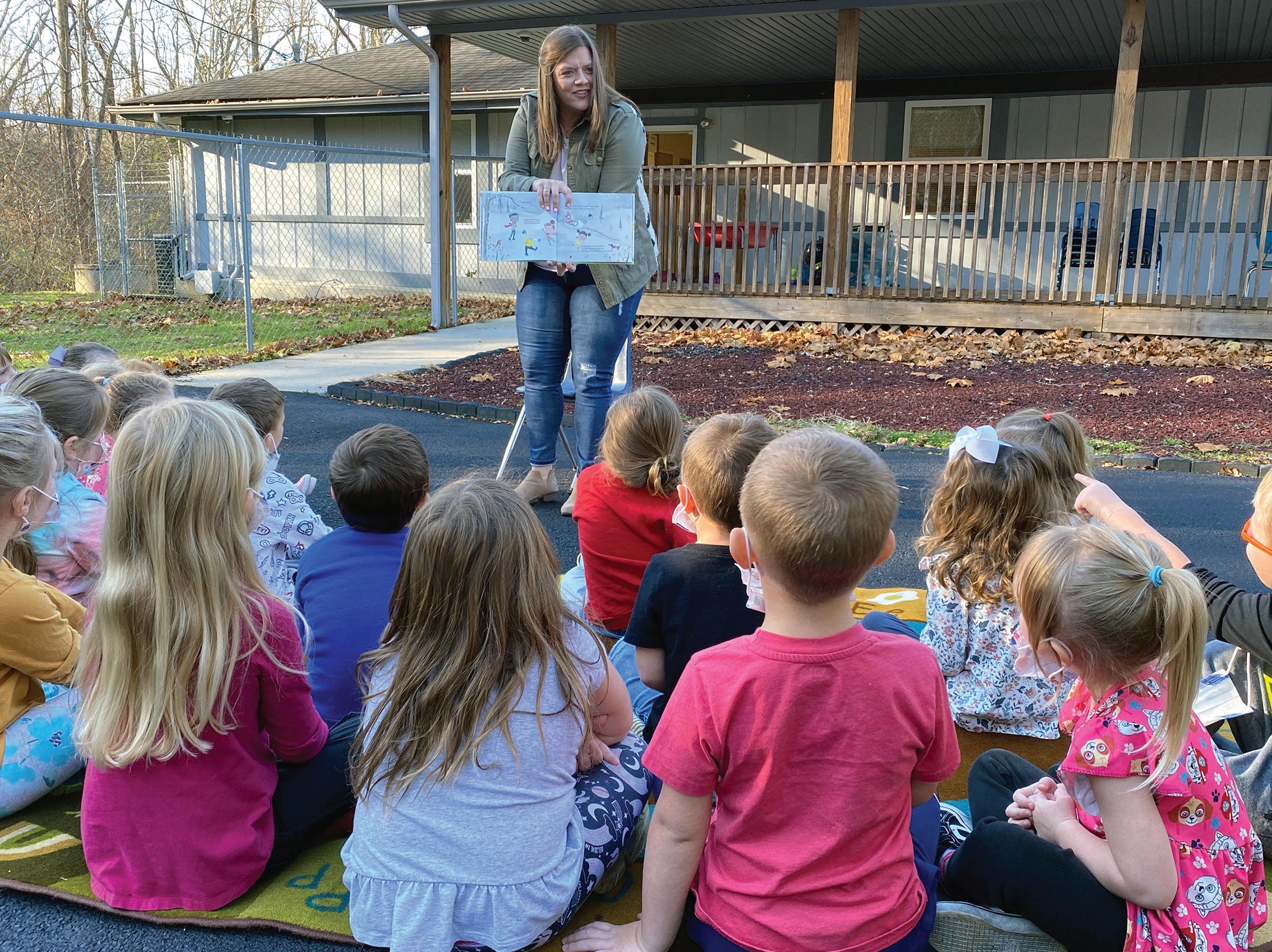
What sounds fun to you?
That’s the question podcast host Annie F. Downs asks her guests to end each episode of her That Sounds Fun podcast. Now that question shares the title of her new children’s book, which the New York Times best-selling author and speaker partnered with Christian Appalachian Project (CAP) to distribute to children during her visit to Appalachia in December.
Through a buy one, give one Giving Tuesday initiative, Downs, her publisher, Baker Publishing Group, and her friends were able to provide a
book for every preschool student at CAP’s Child and Family Development Center in Rockcastle County, Kentucky, and the more than 250 students at Sand Gap Elementary in neighboring Jackson County.
“Literacy is a real tool and a gift. It’s a tool to help you go to places you’ve never been before and a gift to yourself,” Downs said. “As a former educator, and a current author, it’s a dream of mine to equip children and families with literacy. Being able to do that for an entire elementary school that is already working so hard to equip their children, and for me to come
in and be a part of what they are already doing, felt like a real honor.”
An additional 700 copies of What Sounds Fun To You ? have been donated to CAP to distribute. During the school year, CAP’s Youth Empowerment Services Program (YES) staff and volunteers work closely with schools, like Sand Gap Elementary, to provide support for teachers and individualized attention for students, as well as enrichment and recreational programs. YES also touches Appalachian youth through teen leadership and summer camp opportunities.
“After spending a few days with CAP, we are more convinced than ever that CAP is the kind of partner we want to work with.”
— Annie F. Downs
“We continually search for ways to support literacy among the children in our schools,” said Liz Phelps, CAP’s YES Program manager for Rockcastle, Jackson, and McCreary Counties. “Our partnerships with the schools in the counties we serve are very beneficial, and CAP is grateful for Annie’s friendship and support. When we all work together, we are able to increase the impact that is made on the children in Appalachia.”
After reading and distributing her book to the children, Downs spent time with CAP’s Family Advocacy Program helping employees and volunteers pass out Christmas gifts and hams to participants. The distribution annually helps make Christmas possible for struggling Appalachian families. For a second year the distribution was a drive-thru event because of COVID-19 restrictions.
During her final day in Appalachia, Downs and her team visited CAP’s Grateful Bread Food Pantry in Rockcastle County to help fill backpacks with food. One in four children in CAP’s service area face food insecurity. Grateful Bread helps


meet the need for food by partnering with Rockcastle County Schools through the food backpack initiative, which provides weekend nutrition each week during the school year to a group of more than 100 students who have been identified as the most at-risk for hunger.
“We are beyond grateful for the donation and the support Annie has shown for the community,” said Sherri Barnett, community coordinator at the food pantry. “Hunger is
(Above) Annie F. Downs and her team packed food backpacks at CAP’s Grateful Bread Food Pantry during their trip to Appalachia. (Left) Ava Vanwinkle, a student at CAP’s Child and Family Development Center, is excited to receive her own copy of What Sounds Fun To You?
an issue people battle every day, and you never know who is battling hunger. Annie’s donation will ensure the children in our community are able to have the food they need.”
CAP employees and volunteers are looking forward to the continued partnership with Downs and seeing the continued impact she will help make in Appalachia to build hope, transform lives, and share Christ’s love through service.
“After spending a few days with CAP, we are more convinced than ever that CAP is the kind of partner we want to work with,” Downs said. “The way they are serving our neighbors, the way they are a part of what the communities need, they are just stepping in and serving, and we feel really honored to be a part. We are really excited about this partnership moving forward.” n
Early morning fog caresses the Smoky Mountains. Tall windows bathe the bright room in hazy, dust-specked light. Writers filter in with steaming mugs of coffee, nodding and smiling at each other as they find a comfy seat in the circle. Slowly, the gentle creaks of rocking chairs blend like a metronome, soothing and rhythmic, like the group’s collective heartbeat.
This is the Southern Appalachian Writers Cooperative (SAWC), a diverse mix of seasoned and new writers with Appalachian heritage. Gathering from across the region, these highly-awarded authors, poet laureates, professors, students, and aspiring storytellers embrace a mission to cultivate their literary spirit and Appalachian community values.
Clermont County, Ohio, native Sherry Cook Stanforth, Ph.D., the Creative Writing Vision Program Director at Thomas More College recalled her first experience with SAWC. “I’m deeply connected to my heritage, but I don’t often join literary organizations,” she said. “I just fell in love with the annual fall gathering — the writers in this unique group were so encouraging.”
Stanforth said, “The nature of the more established writers is familial. We speak and engage new writers as if they are already part of our circle. We encourage sharing and feedback in a way that promotes genuine literary support and curiosity.”
In 1974, SAWC was born from a group of writers and activists gathering at Highlander Center in New Market, Tennessee, to promote an Appalachian regional identity and act on issues impacting Appalachian land and people.
“We have spoken very strongly on human rights, ecological value, poverty, and addiction,” said Stanforth, the managing editor of SAWC’s annual literary journal, Pine Mountain Sand and Gravel. “Our written pieces are sensitive and reflect care for humanity and community.”

Stanforth said SAWC’s founders valued simplicity. “It’s all volunteer and off-grid,” she said. “There are no sign-up sheets, no membership dues, and we’re not officially a nonprofit.”
Among them were Jim and Robb Webb, of Letcher County, Kentucky. They started the journal, named after their uncle’s quarry, because “the idea of the title is that the writing is new and some of it's kind of rough,” Jim said in 1990.
SAWC hosts annual fall retreats at Highlander Center, writers’ gatherings, regional readings, a panel at the Appalachian Studies Association conference, and publishes the journal that draws contributions from hundreds of writers.
“We hold a creative kinship cultivated by trust, collaboration, community-minded action, and great storytelling,” Stanforth added.
To learn more about the writers cooperative, visit sawconline.net. n

“WeSherry Cook Stanforth, Ph.D.

Drawing by Robert Gipe, robertgipe.com

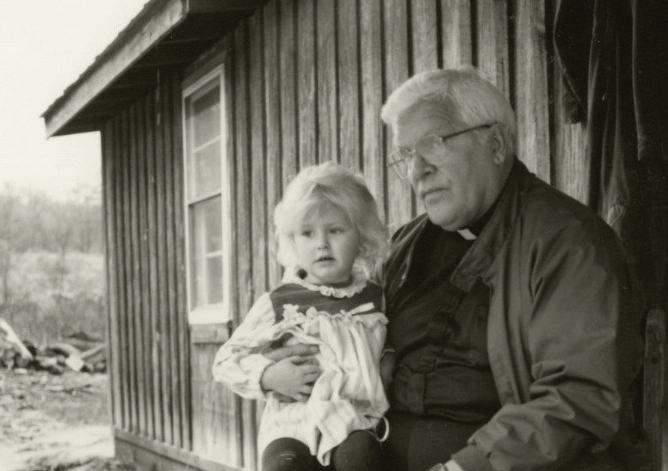

Hannah Adams does camera work as an undergraduate in Convergent Media at Morehead State University.
Hannah Adams is very good at detecting that spark behind an Appalachian Media Institute (AMI) intern’s eyes. Sometimes it’s obvious, like when they can hardly contain their fervor for a new idea. Their eyes widen in disbelief and excitement; like a child opening an unexpected Christmas gift. Sometimes it’s hidden, behind years of conditioned mistrust. It starts to appear once they find that this is a safe space to be themselves.
Adams knows because she felt this spark during her first summer at AMI in 2017. A Letcher County, Kentucky, native, she was struggling to decide if she wanted to follow many other local women and enter the medical field. Like many young Appalachians, she didn’t know what she wanted because she hadn’t been exposed to much.
She credits one of her mentors, Appalshop’s Director of Films, Willa Johnson, whose experience mirrored her own.
Johnson introduced her to AMI, the brainchild of multi-media arts nonprofit Appalshop, in Whitesburg, Kentucky, which was created 34 years ago to teach Appalachian youth media production skills.
“Every summer we provide paid training to 10-14 regional youth in place-based documentary media-making, creative professional development, and entrepreneurship,” said Johnson of the six to eight-week program now directed by Adams, AMI’s lead educator.
Interns aged 14-22 from diverse backgrounds collaborate on documentaries exploring local community issues, providing their own unique perspective. Applications open in late spring, and no experience is required.
“To me, one of the most important things they learn is how to disagree with someone without isolating or insulting them,” Johnson said.
The program is college-accredited, with 80 percent of participants continuing to college. “We meet students where they are, host screenings, and bring young filmmakers with us to network at colleges,” she said.
“[It's amazing] what this program can do, especially for women. You're either going to be a nurse, a teacher, or a stay-at-home wife; those are the career paths the public schools push here,” Johnson said. “Hannah was one of my students who was passionate about films and media. Getting to hire her and see her flourish shows
“Our youth need to be the storytellers; people need to see it from their lens."
— Hannah Adams
we can have more jobs and more opportunities here if we try something new.”
“It feels like it’s come full circle,” Adams said. “This completely changed the course of my life.”
Johnson now helps students become professionallyfunded filmmakers as Appalshop filmmakers retire.
“Storytelling is everywhere; I didn’t have to leave my hometown to do it,” Johnson noted. “Our youth need to be the storytellers; people need to see it from their lens.”
For more information, visit www.amiappalshop.org. n
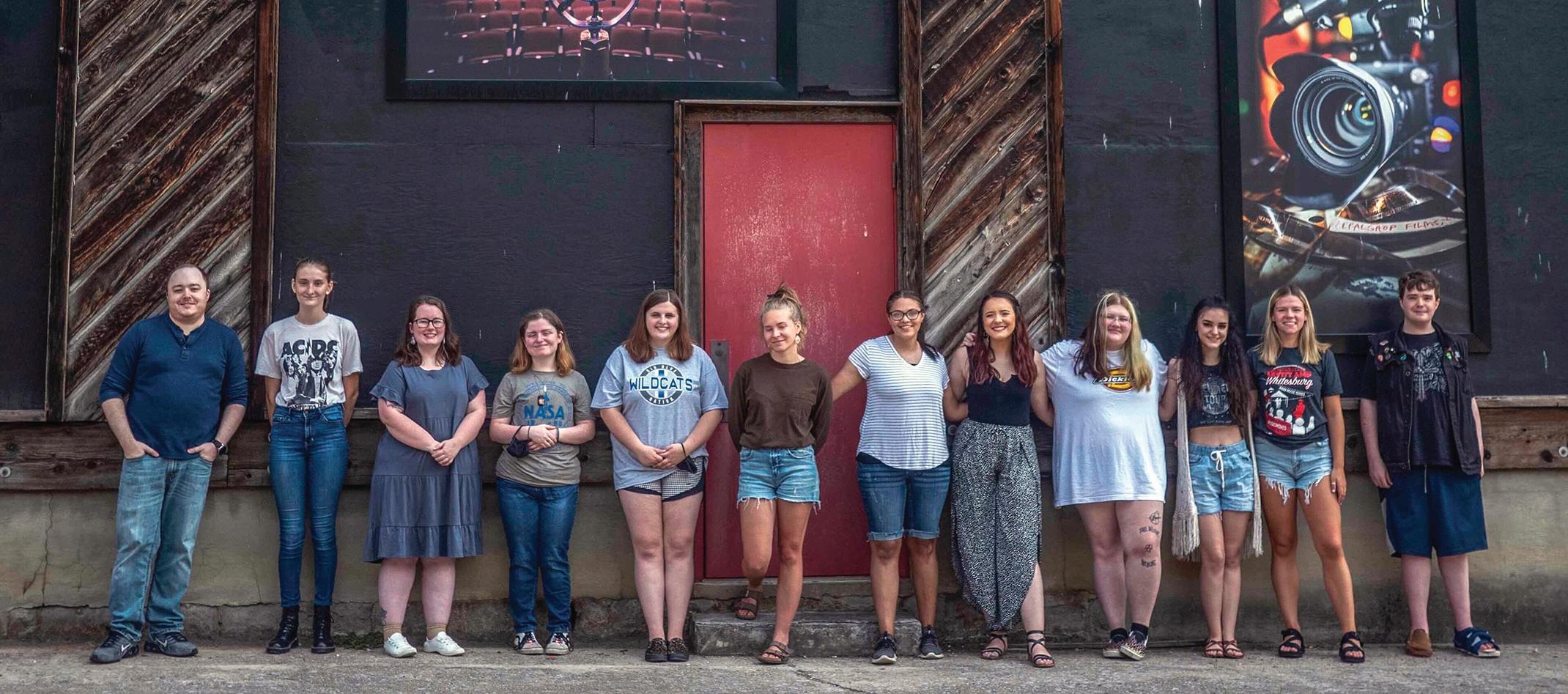

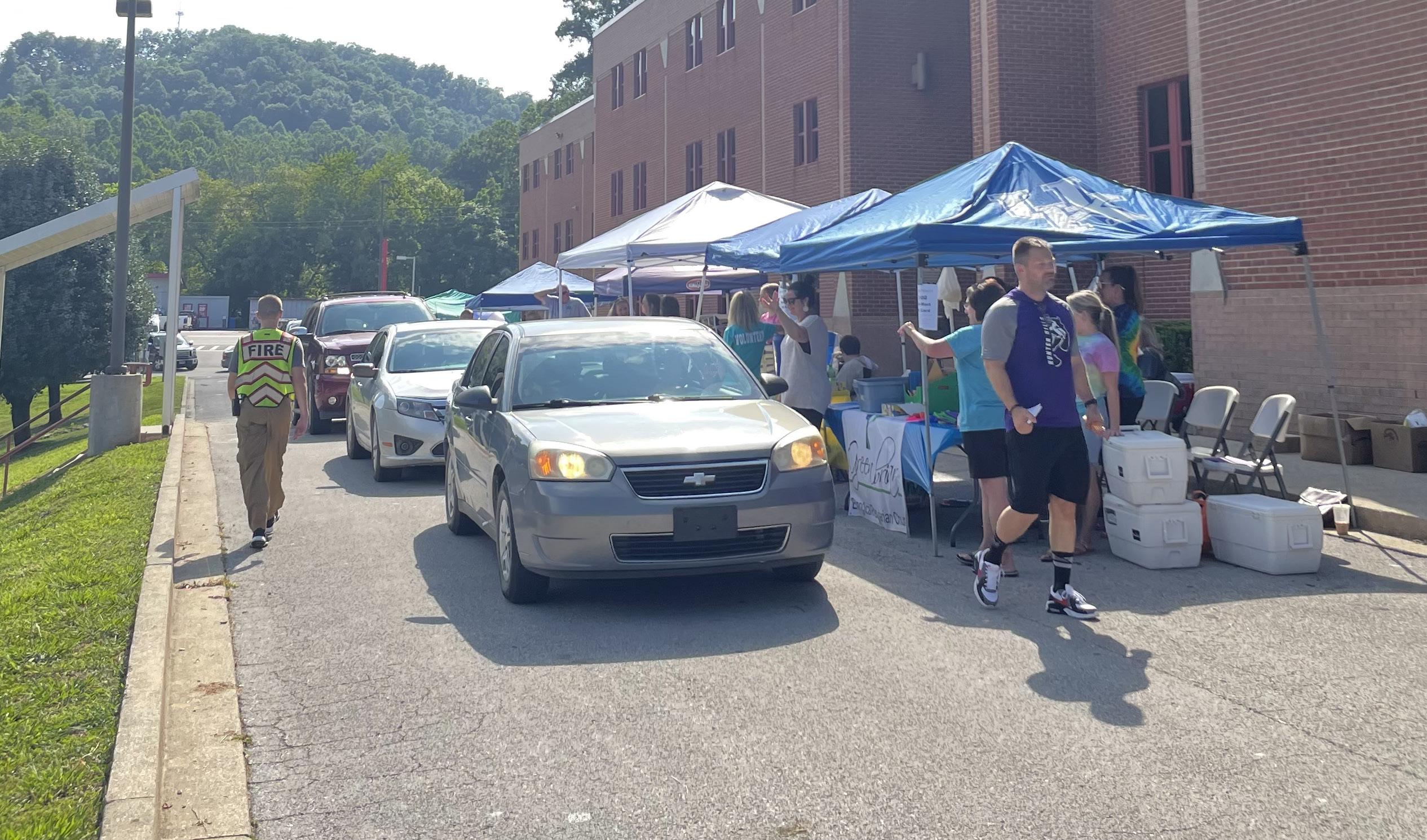
Many communities in Eastern Kentucky struggle with the most basic needs. Christian Appalachian Project’s (CAP) Operation Sharing Program is expanding their capacity to reach into even smaller communities. CAP recently launched a partnership with the Clay County School District and City of Manchester in Manchester/Clay County to open an Operation Sharing Hub.
“Satellite hubs give us the opportunity to reach people in need that can’t afford to drive to our warehouse in Corbin,” said Ben Ridner, who manages Operation Sharing in Corbin, Kentucky. “Smaller churches and organizations can now afford to pick up essentials because the travel time has been cut by more than half.”
Before the hub opened, Ridner said there were about 18 organizations signed up as partners in Clay County. Now, there are around 80 organizations that pick up from the Operation Sharing Hub.
“God opened a door,” said Pamela Mathis, who manages the hub and works for the school district, the city, and the county. “I’ve seen kids hungry. One day I saw a
mother walking in the cold with her two children and one of them didn’t have on shoes. I gave that child a pair of shoes. Having this partnership with Operation Sharing has helped the community. God knew what we needed.”
Partnerships like this one in Clay County don’t happen without local support. Mathis credits Manchester Mayor James Ed Garrison and School Superintendent William Sexton for identifying needs in the community and finding creative ways to meet those needs.
Mathis works with the Family Resource Centers in the district to make sure that students have hygiene products and other needed items. Another schoolbased program that benefits from the hub is Save the Children, which supports literary efforts and provides additional assistance to families in the community.
“We are hoping to make life in the community a little easier,” Ridner added. “Our goal is to help as many people as we can. We feel this is the best way to do it. Clay County is the first hub, but certainly won’t be our last. Operation Sharing wants to have a larger impact in Appalachia.”
“Clay County is the first hub, but certainly won’t be our last. Operation Sharing wants to have a larger impact in Appalachia.”
— Ben Ridner

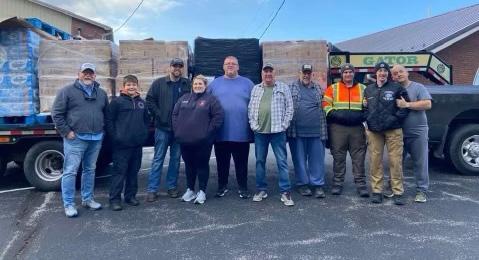
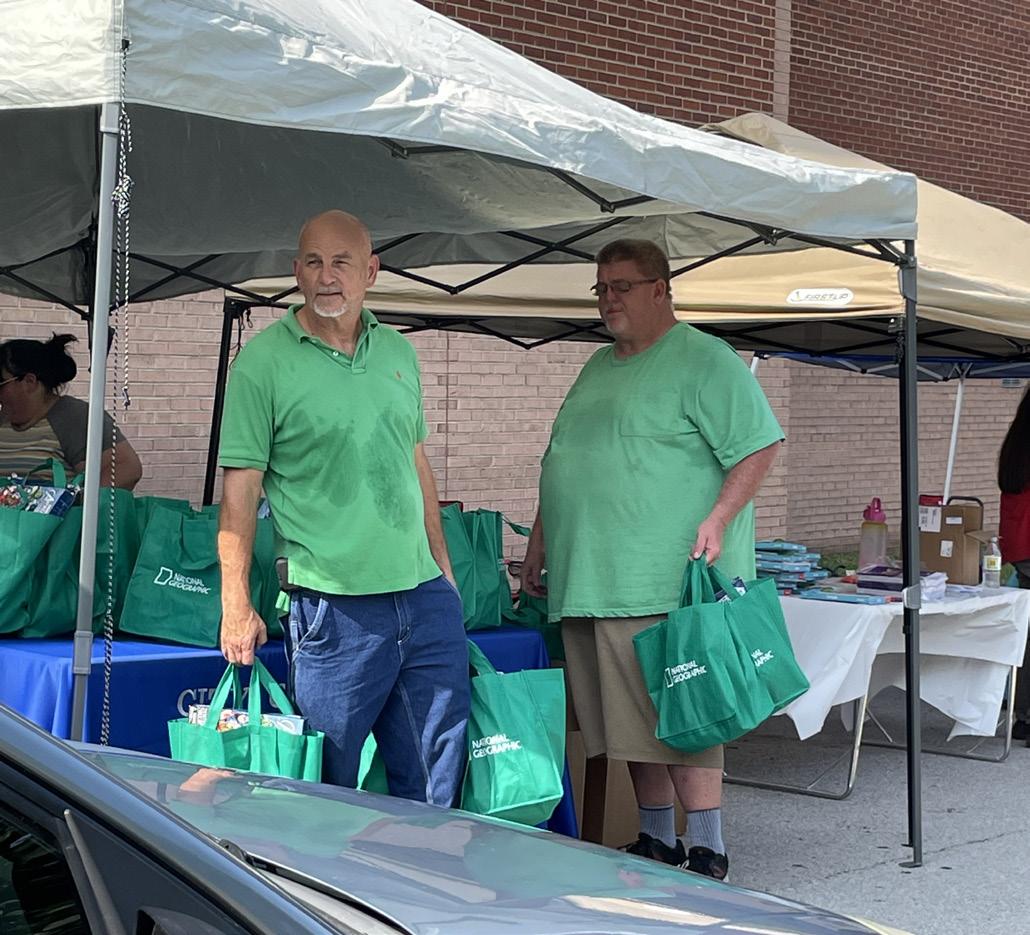
A local business owner provided the 12,000 square foot facility free of charge to support the partnership with the school district, the city, the county, and Operation Sharing. They recognized they could do more by coming together to support families in need throughout the community. Mathis worked with Ridner to arrange delivery of donated items from corporate partners. Since the hub is new, they are averaging about one to two loads a week. Ridner believes that with their capacity, they might be able to distribute four to six truckloads a week to meet needs in Clay County.
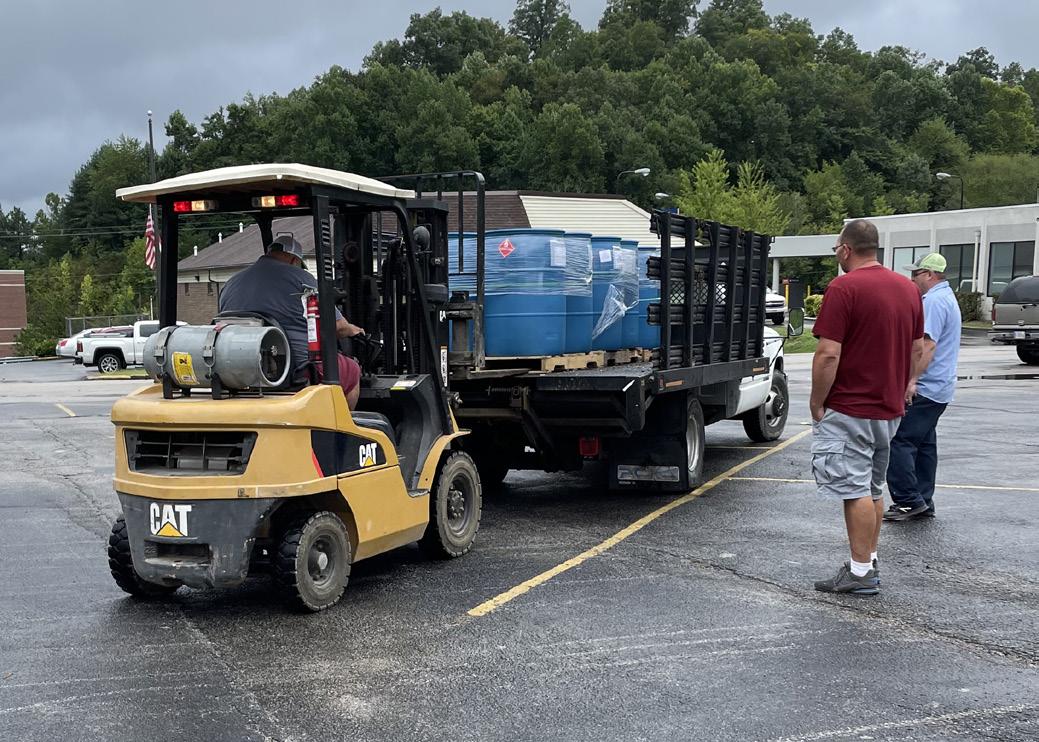
Through
serve 80 local organizations with essential items. Those organizations distribute the items they receive to children, families, and individuals in need in the community.
“Our Operation Sharing partners serve their communities every day, so they see where the need is on a daily basis,” Ridner explained. “It takes a tremendous effort from every organization across Appalachia to meet these needs.”
Ridner noted, “Our partners help us get the product into the hands that need it the most. This would be almost impossible for us to do on this large of a scale without them. We are blessed for all of our partners who are helping us expand our impact in the region.” n
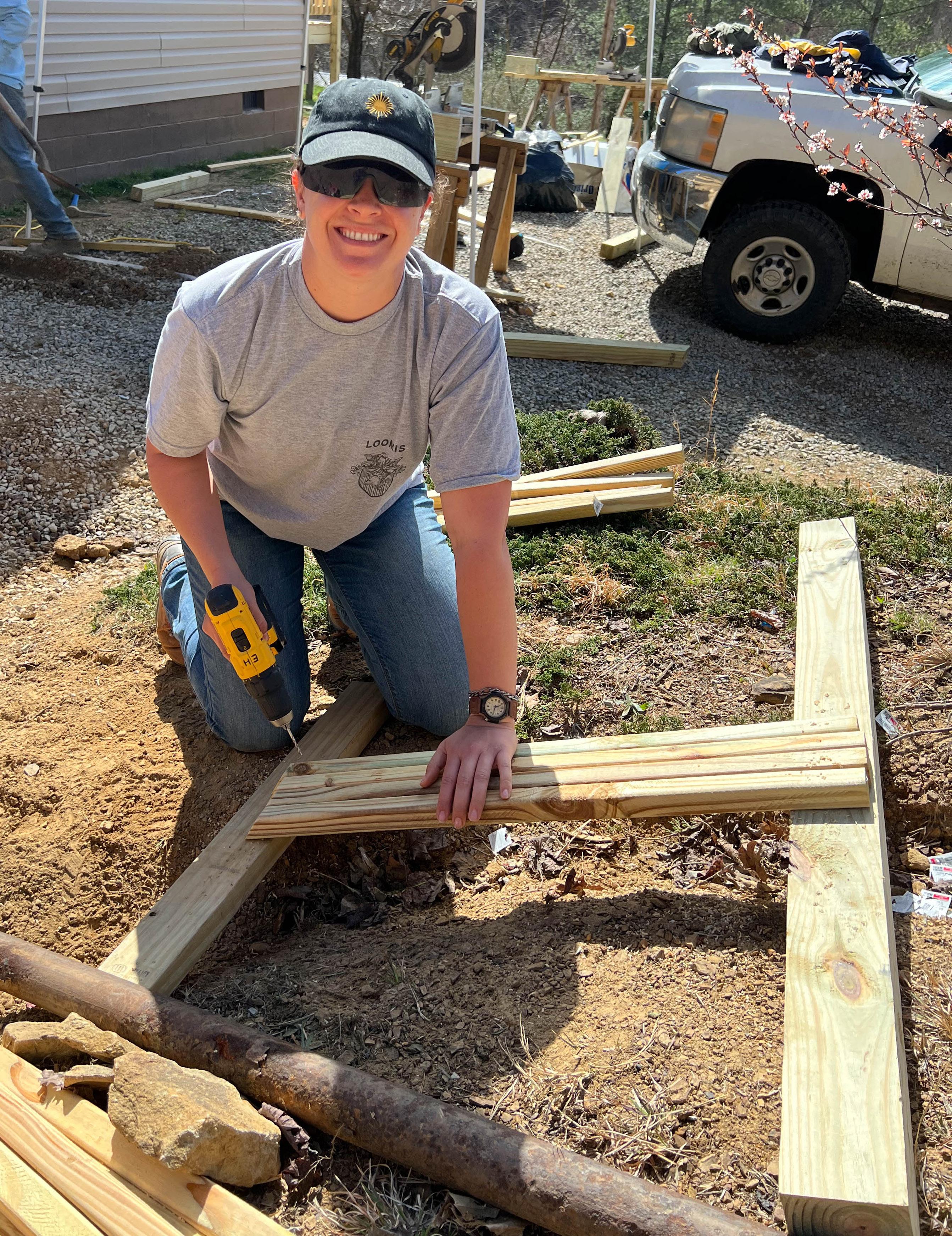
“It’s really amazing to see this project the kids did had a positive impact on someone’s life."
— Michaela Loomis
Service is an integral part of Father Vincent Capodanno High School in Vass, North Carolina. Students and staff from the school traveled to Appalachia this spring to tackle home repair projects during their first YouthFest event, an alternative spring break for high school students hosted by Christian Appalachian Project (CAP).
During their week of service with CAP, the group of students and staff worked to build a new front porch and a back porch with an accessibility ramp for a woman in Floyd County. Watching the group make quick work of the project during the week, she was thrilled knowing she would be able to sit on her new front porch and have more freedom and accessibility in and out of her home because of the ramp.
Students at Father Vincent Capodanno High School are typically given the opportunity to do community service for a few hours every Wednesday, whether that be cleaning a highway, serving at a food bank, or helping in special needs classroom. Expanding their service to a full week through YouthFest not only built a strong bond between the students but showed them the tangible impact their service can make.
“It’s good they understand service, but now they actually got to do it for
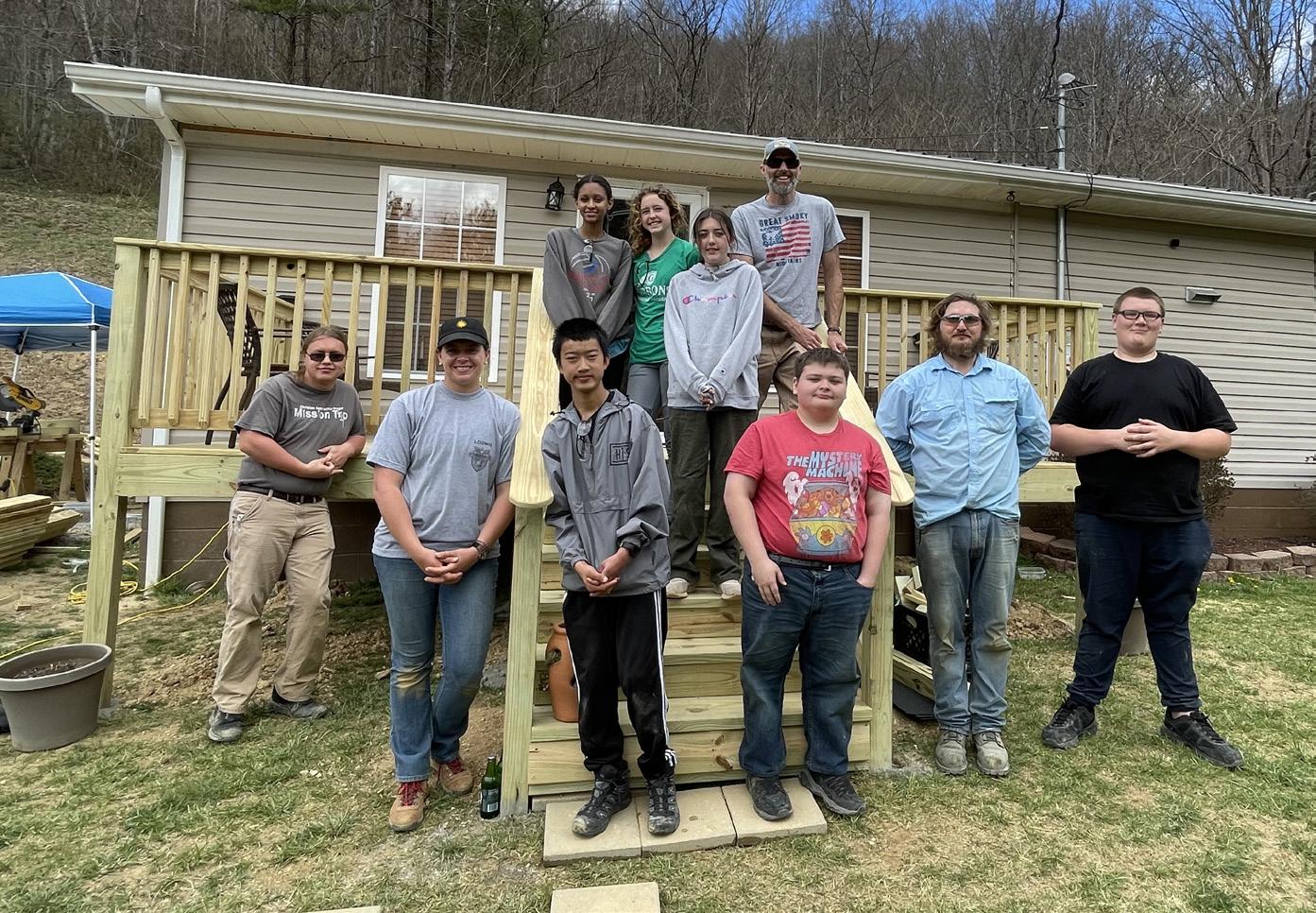
an extended period of time during the week,” said Michaela Loomis, a teacher from the school who joined the students at YouthFest.
“It’s really amazing to see this project the kids did had a positive impact on someone’s life. I think it gave them a good feeling, but it will also be a positive impact for the rest of the school year, maybe even the rest of their lives.”
For many of them, YouthFest was their first experience working with wood and tools. CAP’s Home Repair Program staff and volun -
teers take time during YouthFest to teach groups and volunteers how to safely operate tools in order to complete home repair projects for individuals and families in need.
“I want to do this again,” freshman Lexi Waldo said. “At first I was a little worried about not knowing what to do, but there are a lot of helpful people to help you with the work, and it feels really good knowing you are helping people. I know little things make a difference, and I know our work is going to go a long way.”


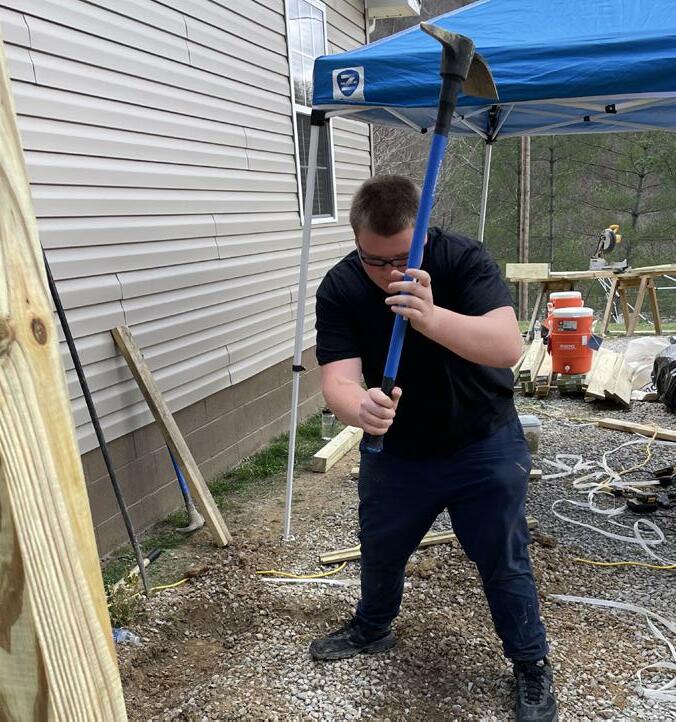
The experience helped the students see a new perspective on not only the challenges people in Appalachia can face, but how they can make a difference in the region.
“It meant a lot to me to be able to do that,” said Julia Attar, a freshman at the high school. “When we first came, we saw the front steps
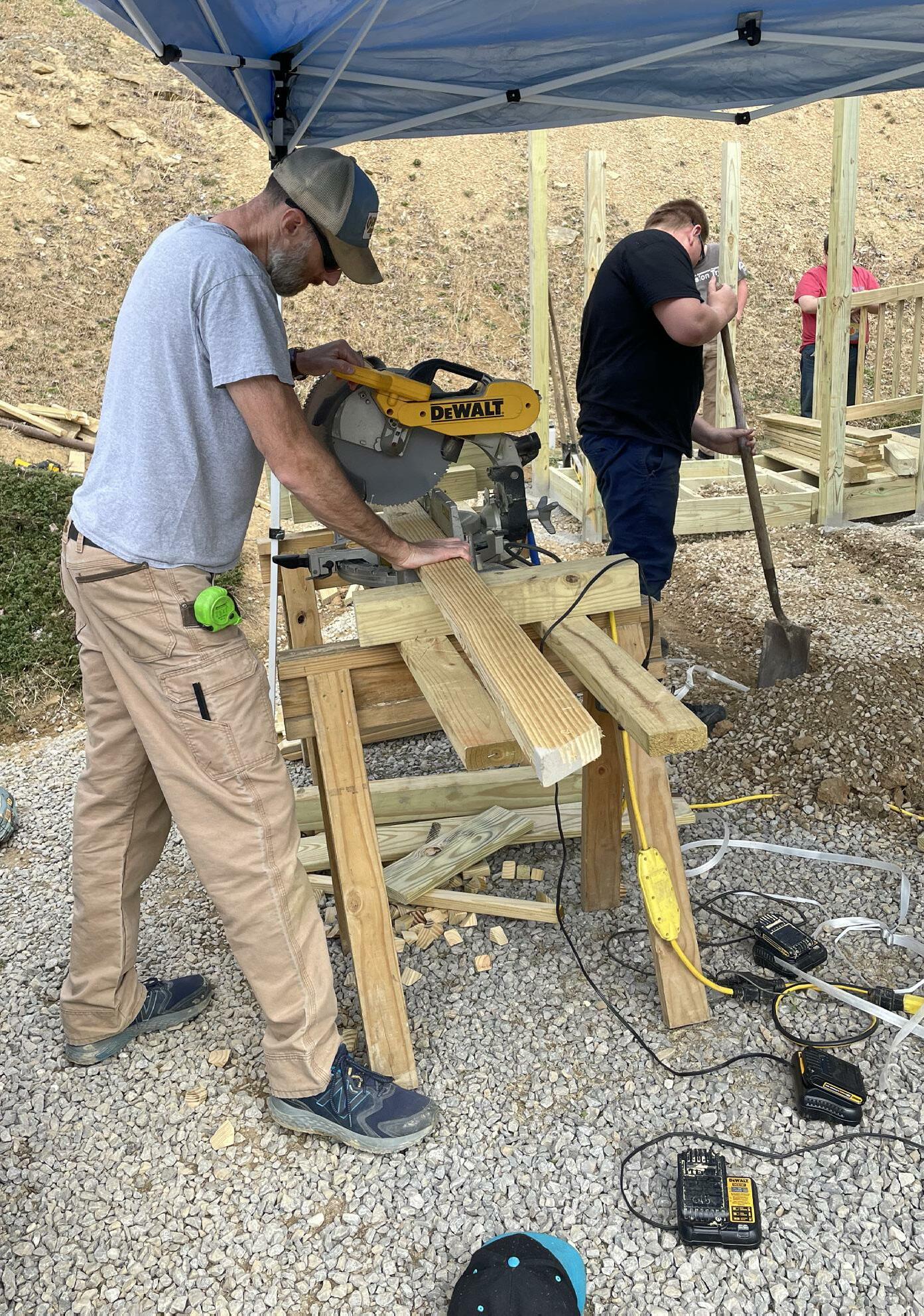
Students and staff made quick work of their home repair project during YouthFest. Here, the group is pictured building an accessibility ramp. For several members of the group, it was their first time working with wood and tools.
of the home were made out of cinderblocks. It means a lot to know I helped her have safe access in and out of her home, and I took away a lot of life skills I can use later on.”
“No matter what age you are, you can still help do big things no matter what,” added Jozeph Capps,
another student who worked on the project.
With the help of groups and volunteers like the students and staff from Father Vincent Capodanno High School, CAP is able to make more homes safe, warm, dry, and accessible for more children, their families, and seniors in Appalachia. n
